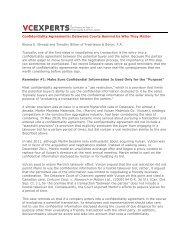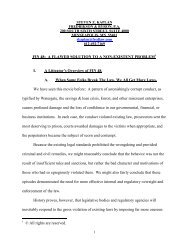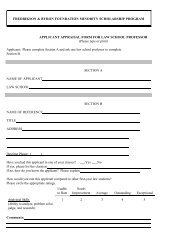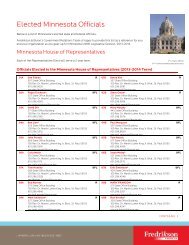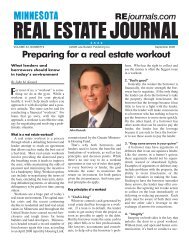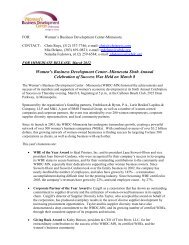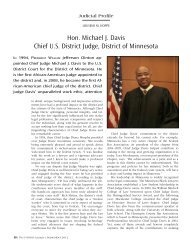Kivalina - Order Granting Motion to Dismiss for Lack of Jurisdiction
Kivalina - Order Granting Motion to Dismiss for Lack of Jurisdiction
Kivalina - Order Granting Motion to Dismiss for Lack of Jurisdiction
You also want an ePaper? Increase the reach of your titles
YUMPU automatically turns print PDFs into web optimized ePapers that Google loves.
1<br />
2<br />
3<br />
4<br />
5<br />
6<br />
7<br />
8<br />
9<br />
10<br />
11<br />
12<br />
13<br />
14<br />
15<br />
16<br />
17<br />
18<br />
19<br />
20<br />
21<br />
22<br />
23<br />
24<br />
25<br />
26<br />
27<br />
28<br />
Case4:08-cv-01138-SBA Document194 Filed09/30/09 Page18 <strong>of</strong> 24<br />
South Carolina waterway. The district court had dismissed the case on the ground that<br />
plaintiffs failed <strong>to</strong> present evidence showing that the chemical content <strong>of</strong> the waterways were<br />
affected by the defendant’s facility or that plaintiffs were negatively affected by the<br />
defendants’ conduct. Id. at 159. In reversing the district court, the court <strong>of</strong> appeal rejected the<br />
suggestion that it must be shown <strong>to</strong> a “scientific certainty” that defendant’s act <strong>of</strong> discharging<br />
effluent beyond the scope <strong>of</strong> its permit caused the precise harm suffered by the plaintiffs. Id. at<br />
161. “Rather than pinpointing the origins <strong>of</strong> particular molecules, a plaintiff must merely show<br />
that a defendant discharges a pollutant that causes or contributes <strong>to</strong> the kinds <strong>of</strong> injuries<br />
alleged.” Id. “Where a plaintiff has pointed <strong>to</strong> a polluting source as the seed <strong>of</strong> his injury, and<br />
the owner <strong>of</strong> the polluting source has supplied no alternative culprit, the ‘fairly traceable’<br />
requirement can be said <strong>to</strong> be fairly met.” Id. at 162 (emphasis added). However, the court<br />
also cautioned that <strong>to</strong> be “fairly traceable,” the plaintiff must lie in the “discharge zone <strong>of</strong> a<br />
polluter” and not “so far downstream that their injuries cannot be fairly traced <strong>to</strong> that<br />
defendant.” Id.<br />
In contrast <strong>to</strong> Powell Duffryn and Gas<strong>to</strong>n Copper, the Fifth Circuit in Tex. Indep.<br />
Producers rejected, in part, an action brought by the Natural Resources Defense Council<br />
(NRDC) seeking <strong>to</strong> challenge proposed regulations promulgated by the EPA as violative <strong>of</strong> the<br />
Clean Water Act. Citing Gas<strong>to</strong>n Copper, the court noted the now well-established principle<br />
that the plaintiff need not establish a nexus between the defendants’ discharge <strong>of</strong> pollutants and<br />
plaintiffs’ injury with “scientific certainty.” Tex. Indep. Producers, 410 F.3d at 973. At the<br />
same time, the court recognized that the “contribution” approach <strong>to</strong> standing is dependent upon<br />
the plaintiffs’ ability <strong>to</strong> plead and prove the defendant’s “‘polluting source as the seed <strong>of</strong> his<br />
injury, and [that] the owner <strong>of</strong> the polluting source has supplied no alternative culprit…’” Id.<br />
at 974 (quoting in part Gas<strong>to</strong>n Copper, 204 F.3d at 162). Ultimately, the court held that the<br />
NRDC had failed <strong>to</strong> show that defendants were the “seed” <strong>of</strong> its injury, finding the “existing<br />
polluted condition” <strong>of</strong> at least three <strong>of</strong> the water bodies involved that had previously resulted<br />
from the discharge <strong>of</strong> raw billions <strong>of</strong> gallons <strong>of</strong> raw sewage from various sources flowing in<strong>to</strong><br />
those rivers annually. Id.<br />
- 18 -



